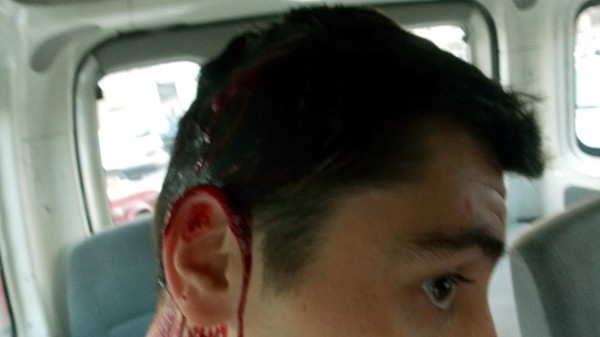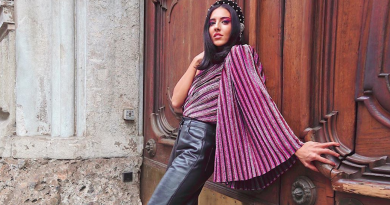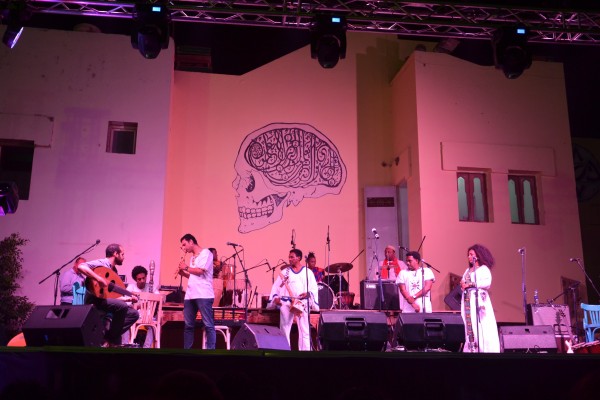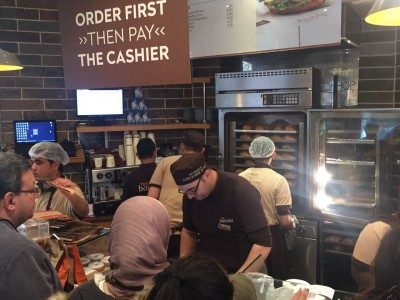Muslim Brotherhood supporter attacks Caravan reporter
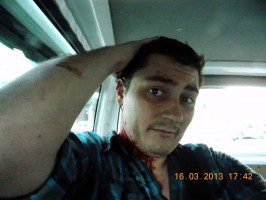
Caravan reporter and AUC exchange student Mark Paquette was hit with a chair as he was covering a protest at the Muslim Brotherhood (MB) headquarters in Mokattam last Saturday.
“I was there to cover the protest. It was supposed to be a party “thanking” the Brotherhood for all they’ve done for Egypt,” Paquette said. “I got there and things were lively but not bad. After a while I started working my way into the crowd for pictures and a few minutes later things got crazy.”
Paquette hadn’t even made it to the headquarters; he was still walking up the road leading to the building.
The protest party was planned by a group called the Sarcastic Revolutionary Struggle whose goal is to use humor and sarcasm as a form of protest. It is the same group that had planned and organized the Harlem Shake at the MB headquarters two weeks earlier.
“It was really unstructured. There were some cops around and a lot of people in plain clothes that had come out to keep the protesters away from the headquarters,” Paquette said.
“No one was taking leadership as far as I could see but some people started arguing.”
Paquette was too far back to understand what the argument was about. He was watching from the back and then one of the people arguing moved away. People started burning things around them as the crowd got more and more agitated. The person who had moved away came back with a chair, hurling it at the man he was arguing with.
“The crowd split when he started swinging [the chair] at people,” Paquette said.
“So when the crowd split to get away from him I ended up on the front line. The guy is swinging the chair at people and I’m trying to get back but there’s a crowd, then he turns to me and hits me on the head with the chair, which knocked me over, too.”
Luckily, the crowd didn’t trample Paquette when he fell to the floor, because they had already run in the opposite direction. Paquette rolled back up to his feet with the help of a couple of people and started running down the road. Realizing he was bleeding, he was forced to cover his head with one hand, holding the camera with the other. He caught up with a press van and jumped in with its reporters.
Paquette remembers that there was a fair amount of press but not nearly as much as at the actual Harlem Shake. He was driven back to Road 9 in Mokattam with the press van; he was supposed to go to a clinic but they looked back and saw that people were getting pushed back towards it.
“We felt like it may not have been the best call, so we found a pharmacy on Road 9 and the pharmacist agreed to help me out, clean me up and bandage my head as much as he could,” Paquette said.,
“[The pharmacist] said he was with the Brotherhood and that the protesters were the problem.”
At first Paquette recalls feeling bewildered, a sense of “wow! That this guy who is an MB member could disagree with the protesters but was willing to help someone wounded in the melee. “I thought, ‘what a cool guy’ but then things got a little sketchy,” Paquette recalls.
The pharmacist spoke a little English, and Paquette a little Arabic so between the two of them, they were able to communicate.
“I had mentioned I was there covering the protest for a story, so after I had rest a while he gets on the phone and is talking to someone.
Then he turns to me and says, ‘you said you were a journalist?’
What did you tell him?
I said yes, told him I was writing for The Caravan (not that he knows it), and then he asked if I had been taking pictures and I said yes, more hesitantly.
Then he wanted to see them.
So I told him I was moving around too much in all the excitement and all the commotion of the protesters moving and avoiding being hit. I told him the pictures were blurry, I think my camera’s broken, etc.
Maybe I was being paranoid but it felt totally wrong [to let him see the pictures].
He turns back to the phone and tells the guy in Arabic “no problem, no problem” and hangs up.
Do you know whom he was talking to?
No, I had no way to know; he didn’t say names or anything.
So how did he react to your refusing to show him the pictures?
He accepted it. Whether he believed it or not, he didn’t push it. Then he insisted that he wanted to take me to the hospital, which wasn’t a terrible idea, but after that sketchy exchange I wasn’t about to go with him anywhere.
I went and bought a new shirt since my other one was super bloody and then I went back out to check and see if the protests had died down.
They were pretty much over. A few stragglers were left and a line of riot cops blocking off the headquarters.
I hopped in a taxi back to Zamalek. By the time I got back the dorm, the clinic was closed so I had to go to Mohandiseen and I ended up with nine stitches.
So did you get in his car at all?
Nope, no way.
How did you talk yourself out of it?
It didn’t even seem like a real choice. I didn’t really trust the guy at this point and I wanted to see how things had turned out, I had been in his pharmacy for probably two hours.
Doing what?
Getting cleaned up first of all. I had blood all over the side of my head, my neck, my shirt, and my jeans. I washed up, washed out the cut, and then he sterilized it and started trying to stop the bleeding.
Was the car still there, [the one] with the journalists who helped you?
No, they went back to keep covering the protests. They got me in, made sure things were cool and then took off.
So how did you turn down his offer to take you to the hospital?
I changed the subject. He had offered to take me, but I said I wanted to get a different shirt because I was all bloody.
We went to a store nearby, and when we got back to his pharmacy I thanked him for everything he had done for me and told him I was fine and I’d get to a hospital soon.
Okay, and did you go to a hospital in Mokattam or did you wait until you got to Zamalek?
I waited. I went back out to see what had become of the protests and what was going on at the MB headquarters, and then I took a taxi back.
I was going to use the clinic in the dorms but it was closed, so I went to a hospital in Mohandiseen.
Does the clinic in the dorms not operate 24/7?
No, it’s basically useless. It’s like Monday/Wednesday/Friday 5:30-7:30. It was actually kind of funny.
I had this big bloody bandage on my head, I’m dripping blood, and security didn’t even seem to notice.
So you went to the dorms, found no clinic, got no help from security and then you took a cab to the hospital?
Pretty much. The guy at the front desk was just like “It’s closed. I don’t know, go to a pharmacy? Or a hospital?” So I got my friend and we went to the hospital.
Is your friend Egyptian?
No, he speaks even less Arabic than me.
So did you guys know where the hospital was or did you just ask the cab driver to take you to a hospital?
I heard about it through another friend. She said they would take AUC insurance, gave us a few directions and then we went.
Which hospital was that? And what happened there?
Mustashfa al Salam. I went into the ER and told them I needed stitches. The guys behind the counter were like “Maybe tomorrow?”
So I opened up the bandage to show them and told them it needed to be right now. They agreed.
Did they get to it right away?
Yeah, actually. The doctor was just finishing up with another patient so he took us into a room, asked me a few questions and then got to work stitching me up.
How did that experience make you feel?
When it happened my first thought was “Damn, I’m an idiot.”
I mean, the way it all went down it could have happened to anyone there. People responded really well.
People were there to help, even the pharmacist.
I knew it was a risk of going but I didn’t ever think it would happen to me.
Would it have been an easier experience if AUC had a 27/4 clinic at the dorms, do you feel that would be necessary?
I don’t know if it’s necessary. It costs money to run the clinic so I can see the reasons why you would limit the hours, but I think it’s a bad area to cheap out on. It’s surprising that they don’t have any medical or basic first aid trained personnel around the dorms.
That seems like a pretty simple improvement that could be made.
Did AUC insurance cover you at least or did you have to pay for it?
Yeah, the hospital took AUC insurance so it was all covered.
That’s great. Were you guys told about the hospitals that take AUC insurance or did you only find out from your friend?
I’m sure we were told at the beginning of the semester but it’s not posted up around the dorms or anything.
Most people I talked to were surprised that they took the insurance, but some knew about it.
It’s nowhere in the dorms or anything?
I’m sure if I kept asking at the desk they could’ve given me the information, but I haven’t seen it posted anywhere around the dorms.
Did the security guards not ask you to go get it checked out or tell you where to do so when they saw you walk in, huge bandage on the head and all?
Nope. I actually had my bloody shirt in my bag, first thing. I passed through a bag check and talked to the desk and got no questions about it.
The only AUC staff member who had questions was actually a room cleaner I saw on my way to my friend’s room.
How did that make you feel about how safe you are at the dorms?
I’ve suspected a lot of security in Egypt is for appearances more than the effectiveness, so I guess I wasn’t entirely surprised, but I figured I’d have at least something said about it.

